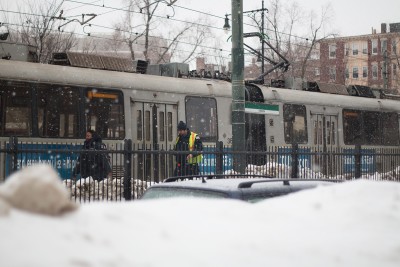
To better communicate the resources for the Massachusetts Bay Transportation Authority with the public, the MBTA announced Tuesday the launch of its Winter Happens awareness campaign for the coming snowy season.
Advertisements in T stations as well as billboards will support the campaign, according to a Tuesday press release, and information will also be available online.
Stacy Thompson, deputy director of the transportation interest group LivableStreets Alliance, explained the drastic effects of last winter that make these new efforts necessary.
“There has been, and rightfully so, a tremendous amount of focus on the breakdown of the transit system in Boston during the winter of 2014-2015,” Thompson said. “I think sometimes what falls to fray is that it wasn’t just a breakdown of the transit system. There were sidewalks that weren’t shoveled. There were lots of bike lanes that weren’t clear and weren’t safe.”
The campaign is part of the $83.7 million Winter Resiliency Plan, which was created by Massachusetts Gov. Charlie Baker, Massachusetts Secretary of Transportation Stephanie Pollack and MBTA General Manager Frank DePaola.
As part of preparation for winter, Baker gave updates about the plan and said at a Wednesday press conference at the T’s Emergency Training Center in South Boston that the MBTA has acquired snow-clearing equipment. The MBTA now owns two engine-powered snow blowers and two Swingmasters to throw snow, according to the release.
Baker explained in a June press release that the importance of the Winter Resiliency Plan is for Boston to be prepared once winter strikes.
“In the event of another harsh winter, it is critical we are prepared,” Baker said in the release. “But, without the flexibility and dedicated oversight of a Fiscal Management and Control Board and the reforms we outlined, the T will continue to fail its stress tests for commuters and taxpayers who deserve a reliable world class transit system.”
Besides examining the MBTA’s reactions to last winter’s massive snowfalls, Thompson said focusing attention and efforts on just the T is “missing the mark.”
“In addition to the much larger questions about management and things that are getting attention at the MBTA level, we need to take a much broader look at what we mean by transportation and not just think about year-round transportation, not just being about in cars or on the train,” Thompson said, “but we can alleviate some pressures if we are mobile in our perspectives.”
Several residents said that while last winter was difficult, they look forward to better transportation this season.
Pasha Noorian, 27, of downtown, said last winter was his first winter in Boston.
“[The winter] was a good first experience and now I can handle anything,” he said. “Fortunately, I live two minutes away from my school, so I had no problems with the [transit system], but some of my classmates spent two to three hours just to get to class in the morning and they would pay [an] Uber 30 bucks just to get to school.”
Itxaso Garay, 21, of Mission Hill, said the hours she spent on public transportation were “awful.”
“I had to take public transportation everywhere to volunteering and stuff, and I just remember being on the bus for two hours,” she said. “I’m going to study abroad in Brisbane, Australia, next semester because of last winter. I can’t handle [the snow] anymore.”
Morgan Whitney, 20, of Mission Hill, said the lack of snow removal made it hard to navigate the city.
“It was going to be a snow day so my friends and I went [for a walk] and it took hours,” he said. “We took like three Lyfts, it was stupid. We just gave up because it wasn’t worth it. It was just too much to bear.”






















































































































